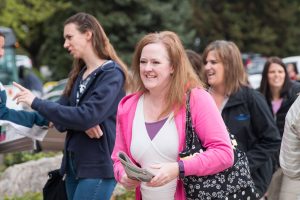
Catherine Taylor and John Bytheway, both religion professors at BYU, spoke about the influence the Book of Mormon had on their lives and could have on others’ lives at the 2016 Women’s Conference.
Taylor focused on how the scriptures can connect a person with God. She explained that if she wanted her children to listen to her and follow her example she would have them look at her eyes. The scriptures, she said, are like looking at God.
“(God) asks us to treat scripture the way it was intended,” she said. “He wants us to look at him.”
She explained that by looking at God, by loving him, one will follow His example. In her slideshow she wrote, “Do your best to present yourself to God as one approved, a worker who has no need to be ashamed, rightly handling the word of truth.”
She asked the women present to think about three questions in regards to rightly handling the word of truth. They were: How do we know what the Book of Mormon says? What does it mean? and How does it change me?
She answered the first question by referring to Jacob 4 in the Book of Mormon.
She said the chapter explains that to know what the scriptures say, one must labor diligently, receive with thankful hearts, look upon (the words) and learn with joy.
Nephi’s vision, found in 1 Nephi 11, was used to answer the second question.
Nephi, she explained, wanted to understand each part of the vision he saw and asked for interpretations. Taylor encouraged the women to look for interpretations.
She also addressed some ways that one can use the scriptures for personal growth. These ways include looking for comfort in scriptures, looking for a checklist of things that needs to be done, opening the scriptures to a random page for revelation (which she call is “kind of a pagan magic eight-ball way of looking at scripture”), looking for specific topics and looking at scriptural commentary.
Taylor invited the women to set aside those five ways and read the whole text many times and come to know the scriptures. She explained that once the women know the scriptures then their lives will be changed.
She continued by mentioning that love of scriptures and God is key to understanding scriptures, but “you cannot love what you do no know.”
Bytheway followed Taylor by talking about the four reasons why people read the Book of Mormon. These included: guilt or shame, bribery, medicine and promises.
He expanded on the promises written in the Book of Mormon, which includes the ability to withstand temptation, deception, and to do what’s right. He shared an experience with speaking to the high school seminary class from Columbine shortly after the shootings there.
During his visit, he shared five scriptures “that will help you get through almost anything” with the seminary students, explaining that he wouldn’t be able to tell them why things happen but that he could give them knowledge that will never change.
The first was 1 Nephi 11:17, God loves his children. The second was Moses 7:26-33, God allows evil in the world, but He is not unaffected by trials His children experience. The third was Alma 14:9-13, if one is still alive their work is not finished. The fourth was Alma 7:11-12, the Atonement of Jesus Christ was not just for sinners . The fifth was D&C 101:32-36, one day the Lord will answer all questions.
Bytheway then shared an experience of when a member of an evangelical church told him “you guys believe in the Jesus of the Gaps,” or the idea that what one person will do things to be saved and then Jesus makes up the rest.
Bytheway explained that he went home and looked up merit in the Book of Mormon to find answer to this idea of “Jesus of the Gaps.” He found that every scripture stated that it was the merits of Christ that one is saved, and that by an individuals own merits nothing could be accomplished.
He closed by speaking to the single adults in the room. Bytheway encouraged the single adults and all others present to put the things of the past behind them and get involved in the three fold vision of The Church of Jesus Christ of Latter-day Saints which is to redeem the dead, perfect the saints and proclaim the gospel.




